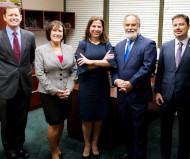Article from: www.thenewspaper.com/news/67/6752.asp
7/16/2019
San Mateo, California Dumps Red Light Cameras
Shortened yellow light refunds and lack of safety benefit spurred San Mateo, California to pull the plug on red light cameras.
 The vast majority of California cities that have experimented with red light cameras have come to regret their decision. The city council in San Mateo voted unanimously on Monday to become the latest jurisdiction to abandon photo enforcement after it came to light 985 tickets worth $472,800 were issued at an intersection with the yellow warning light set to an illegally short duration.
The vast majority of California cities that have experimented with red light cameras have come to regret their decision. The city council in San Mateo voted unanimously on Monday to become the latest jurisdiction to abandon photo enforcement after it came to light 985 tickets worth $472,800 were issued at an intersection with the yellow warning light set to an illegally short duration.
The yellow light had been shortened from the state-mandated 3.6 second minimum to 3.4 seconds at the camera-enforced intersection of Saratoga Drive and Hillsdale Boulevard between December 4, 2018, and May 20, 2019. While 0.2 seconds does not sound like much, tiny changes in timing have a massive impact on violations. A Texas Transportation Institute study found that the majority of straight-through red light violations happen when a driver misjudges the end of the yellow light by less than 0.25 seconds (view chart). The study also confirmed that longer yellows reduced accidents (view report).
"This error raised some concern from staff regarding the accuracy of the other intersections and an immediate audit and suspension of the program was initiated citywide," city manager Drew Corbett wrote in a memo to the city council. "During this review time, staff has concluded that the effectiveness of the program has decreased over time and that the public safety benefit is not significantly impacted by this labor-intensive and complicated program."
San Mateo will issue refunds to anyone affected by the shortened yellow, as it has done once before. In 2015, the city had been caught using similarly short yellows.
"Although the two occurrences of yellow light timing errors are distinctly different, staff believes operating a technical and highly sophisticated automatic photo enforcement system with exceptionally strict standards that continue to change over time will inevitably yield additional human or technological errors," Corbett wrote.
Redflex Traffic Systems of Australia has been in charge of the program since 2005, issuing tickets at three intersections. In just the past six years, Redflex issued 27,708 automated tickets worth over $13 million. Despite the firm's promise that these tickets would lead to a reduction in accidents, city staff found otherwise examining sixteen years of data.
"Neither the number of total collisions, number of red light collisions, nor the number of collisions occurring at the three photo enforced intersections have changed significantly over time," Corbett explained.
San Mateo's photo ticketing program will terminate on October 20, joining the following cities that have dropped red light cameras: Belmont, Bell Gardens, Berkeley, Burlingame, Cerritos, Compton, Corona, Costa Mesa, Cupertino, El Cajon, Davis, El Monte, Escondido, Emeryville, Fairfield, Fresno, Fullerton, Gardena, Glendale, Grand Terrace, Hayward, Highland, Indian Wells, Irvine, Laguna Woods, Lancaster, Loma Linda, Los Angeles, Long Beach, Marysville, Maywood, Menlo Park Montclair, Moreno Valley, Napa, Oakland, Paramount, Pasadena, Poway, Rancho Cucamonga, Redlands, Redwood City, Rocklin, Roseville, Rowland Heights, San Bernardino, San Carlos, San Diego, San Jose (photo radar), San Juan Capistrano, Santa Fe Springs, Santa Maria, Santa Rosa, South Gate, Stockton, Union City, Upland, Vista, Walnut, Whittier, Yuba City and Yucaipa. The city councils of Laguna Niguel and Orange passed ordinances banning cameras in 2011. Residents of Anaheim, Murrieta and Newport Beach voted to ban red light cameras at the ballot box.
 The vast majority of California cities that have experimented with red light cameras have come to regret their decision. The city council in San Mateo voted unanimously on Monday to become the latest jurisdiction to abandon photo enforcement after it came to light 985 tickets worth $472,800 were issued at an intersection with the yellow warning light set to an illegally short duration.
The vast majority of California cities that have experimented with red light cameras have come to regret their decision. The city council in San Mateo voted unanimously on Monday to become the latest jurisdiction to abandon photo enforcement after it came to light 985 tickets worth $472,800 were issued at an intersection with the yellow warning light set to an illegally short duration.